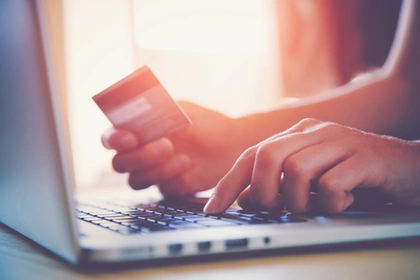1. Pay on time, every time
To make the best use of your credit card, it’s important to make your payments on time every month. This will build up a good credit history and make you more appealing to lenders. If you miss a payment, it will impact your credit score and fees and interest will apply.
2. Set up a direct debit
Set up a direct debit for at least the minimum monthly amount so that you never miss a payment. Make sure you have enough funds in your bank account to pay these bills, so you don’t incur overdraft fees.
3. Set a sensible spend limit
Make sure you set a sensible spend limit on your card, so you aren’t tempted to spend more than you can afford. Ideally, try and reduce your outstanding balance to around 30% of your credit limit (which is £300 out of a £1,000 limit for example).
4. Use your card to build up your credit history
You can build up your credit history by maintaining the repayments on your credit card. Just make sure you pay on time, every time and don’t go over your credit limit or this will damage your credit score. Over time, this will show lenders that you are a responsible borrower and help boost your credit score, meaning you’ll have access to better credit deals in the future.
Check out our recent blog on how to fix a thin credit history for more ideas.
5. Check your credit card statements
Make a note of any purchases you make with your credit card, or keep the receipts. Then you can cross-reference them against your credit card statement to make sure you haven’t been charged for anything extra. If you find any suspicious transactions, contact your card issuer straight away to let them know.
6. Clear the balance in full each month
You can avoid paying interest on your credit card altogether if you clear the balance in full each month.
To achieve this, try to keep your spending within affordable limits.
To help to keep it affordable, you could use your card for emergencies only, instead of for impulsive purchases. It’s also best not to rely on your credit card to pay for household bills.
Ocean Credit Card
See if it's a YES before you apply
- Up to £8,000 credit limit
- Checking won't affect your credit score
- Get a response in 60 seconds
Intelligent Lending Ltd (credit broker). Capital One is the exclusive lender.

7. Clear the balance before the end of an introductory offer period
If you’re on an introductory interest-free period of 0%, check when the offer runs out, and make sure you clear all or as much of the balance as you can before the offer ends. This way you’ll pay no or as little interest as possible.
Or, if you still have a balance remaining at the end of your deal, think about moving it to another 0% card, so you aren’t charged interest or fees. Try not to rely on this strategy though, as there’s no guarantee you will be accepted for another 0% interest offer again.
8. Don’t make transactions on a 0% balance transfer card
Unless your card also comes with 0% interest on purchases, avoid spending on a balance transfer card if you can. Otherwise, you’ll be charged interest on any purchases you make.
9. Contact your card issuer before you go abroad
Get in touch with your card issuer before you go travelling. By pre-warning your provider, you should be able to access your credit card abroad without a hitch. (Extra charges may apply for transactions made abroad).
10. Don’t use credit cards to withdraw cash
It’s never a good idea to withdraw cash from a credit card. If you do, interest will be added (usually straight away as opposed to the usual 40-60 day grace period for purchases). You may also face a cash handling fee of around 2% of the amount you withdraw (so £2 on top of every £100).
Benefits of using your credit card effectively
- Convenient access to funds when you need it
- You can build up your credit score using a credit card if you maintain your repayments and don’t exceed the limit
- Spreading the cost of big one-off purchases makes them more affordable
- You could be eligible for rewards on your credit card (rewards can cost extra, and eligibility depends on the lender’s criteria)
- Credit cards offer more security than cash. If you notice any fraudulent activity on your card, you shouldn’t be liable to pay it.
- Some purchases made on credit cards are protected by Section 75 of the Consumer Credit Act. This means you’ll be able to apply for a refund on purchases between £100 and £30,000 - even if the seller goes bust.
- Credit cards come in useful for emergencies or when other unexpected costs arise
- You could use a balance transfer card to save on interest, so you can pay your debts off quicker (if you meet the lender’s criteria)
- You won’t pay any interest if you clear the balance in full each month
Before you make a formal application for a credit card, use an eligibility checker to see if you’re likely to be accepted before you apply, without affecting your credit score.
Disclaimer: We make every effort to ensure content is correct when published. Information on this website doesn't constitute financial advice, and we aren't responsible for the content of any external sites.






